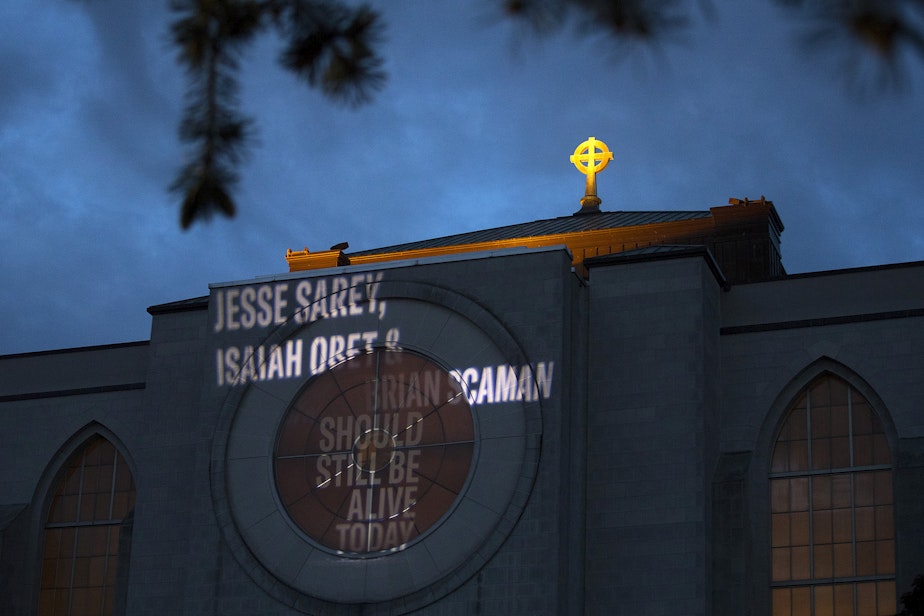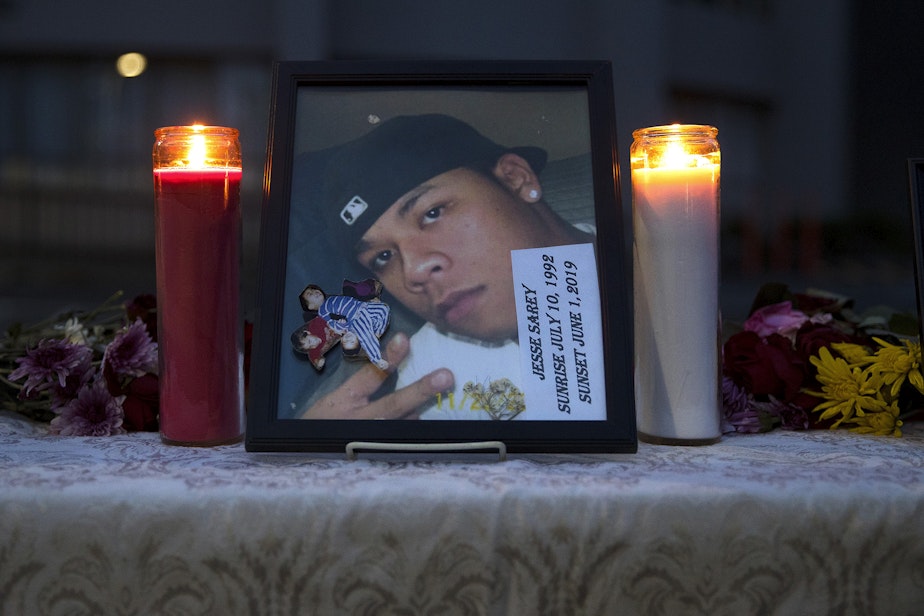'They should be alive:' Families, advocates honor Washingtonians killed by police

T
he family and friends of Jesse Sarey say they are anxiously awaiting an outcome in the case against Auburn police officer Jeffrey Nelson, who is charged with second degree murder and first degree assault in the killing of Sarey in 2019.
They were looking forward to a previously set trial date of Oct. 25. But Nelson’s defense team, citing tens of thousands of pages of discovery documents, is now requesting an extension to Feb. 28.
In the meantime, Sarey’s loved ones are advocating for systemic changes to policing and keeping memories of Sarey — and other Washingtonians killed by law enforcement — alive.
Sarey's relatives joined the family members of other Washingtonians killed by police during a press conference outside of the Maleng Regional Justice Center Thursday afternoon, following the latest hearing in Nelson's murder case.

“There were so many other options to de-escalate the situation,” said Mary Sing, a younger cousin of Sarey. “But they had to take his life for what? He was my cousin, a brother, a son, and a nephew. He was going through some stuff, but honestly, who doesn't? No one ever deserves to get killed, especially for a mental health crisis.”
RELATED: Auburn officer charged with murder in 2019 police killing, testing new deadly force legal standards
Nelson shot and killed Sarey on May 31, 2019 while responding to a series of 911 calls about a man behaving erratically on the premises of several Auburn businesses.
Within 67 seconds of attempting to arrest Sarey for disorderly conduct, Nelson shot Sarey twice: Once in the abdomen and once in the forehead. Nelson had not waited for backup to arrive before attempting to make the arrest, and he did not administer medical aid to Sarey following the shooting, according to court documents.
Sarey was the third person to be killed by Nelson since he joined the Auburn Police Department in 2008.
RELATED: This Auburn cop killed 3 and injured others. His department didn't stop him — outsiders did
"This officer's certification should have been revoked for his pattern of behavior," said Elaine Simons, Sarey's foster mother. "And our hope is that if measures like this were in place, Jesse would be alive today."
Later that evening, roughly 20 people gathered outside of Saint Mark’s Episcopal Cathedral in Capitol Hill for a vigil honoring Sarey, as well as Brian Scaman and Isaiah Obet, two men also killed by Jeffrey Nelson. Each of their names names, followed by the phrase "should still be alive today," were projected onto the cathedral's facade, illuminating the dusky sky.
The vigil was organized by the American Civil Liberties Union of Washington and the Washington Coalition for Police Accountability. The gathering was part of a series of nightly memorials during which the names of people killed by police are projected onto the cathedral.
Sponsored
"This is about human beings and their right to life, and their right to safety," said Reverend Canon Jennifer King Daugherty with the cathedral. "And to sort of meet the people who knew those who were killed, and to hear about their loved one — who they were and what they loved and enjoyed. That's the human connection and we're brothers and sisters in that way."
Kari Sarey, Sarey's biological mother, said the loss of her son and subsequent pursuit of justice has left her feeling "overwhelmed, frustrated, and miserable." But in its own way, she added, his death has brought her family closer.
Nelson's defense attorneys Emma Scanlan and Tim Leary appeared in court on Thursday for a routine hearing. Nelson, who waived his right to appear in-person, also waived his right to a speedy trial, they said.
Nelson was the first officer to be charged under Washington's Initiative 940, which eliminates a long-held legal standard of not charging officers in deadly force cases unless it can be proven they acted with "malice." Nelson pleaded not guilty.




